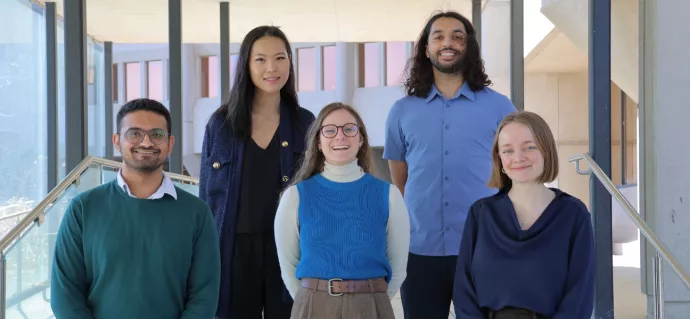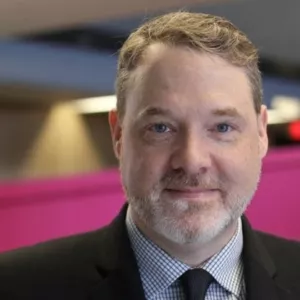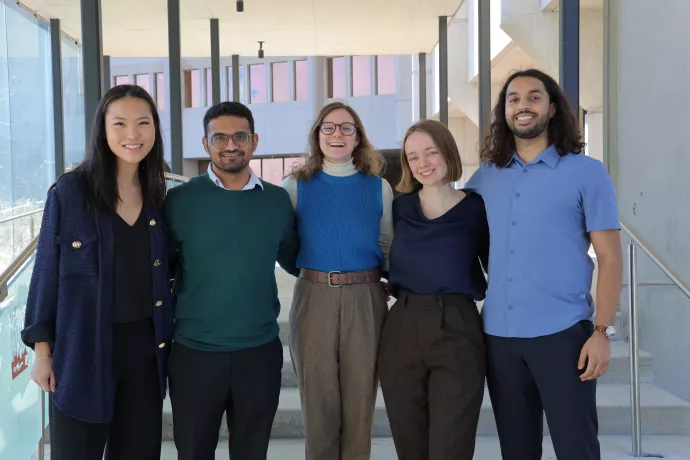
MScSM Team wins 2024 RBC x Rotman Sustainable Finance Case Competition
For the second year in a row, a team of five Master of Science in Sustainability Management (MScSM) students from the Institute for Management & Innovation (IMI) won the RBC X Rotman Sustainable Finance Case Competition, held in March 2024. Team Sustainable Future Finance included Lucy Li, Deep Parekh, Purav Patel, Dena Van de Coevering and Alissa Ward, who leapt at the opportunity to engage in the competition and apply their interdisciplinary thinking, diverse backgrounds, sustainability knowledge and drive for sustainable change to real-time, real-business challenges.
Hosted by RBC and the Michael Lee-Chin Family Institute for Corporate Citizenship at the Rotman School of Management during the RBC x Rotman Sustainable Finance Week, the annual Competition is designed to enable graduate and MBA students from across the country to dive deeply into timely and imminent challenges faced by major financial institutions in Canada.

“The world has changed”, says Rod Lohin, Executive Director of the Lee-Chin Institute. “More than 50% of the Canadian financial markets are now considering environmental and social risks to maximize returns. Students need to be ready for this, and the competition gives them real-world problems to grapple with”. Ultimately, says Lohin, students who participate in the competition are well-poised to “lead the way in changing markets”.
The 2024 Competition attracted 24 teams from around the country, and marked the 5th year of the challenge, with a focus on just transition and net-zero growth strategies for traditional portfolios. Says Ward, teams needed to conceive of ideas “[that supported] the notion of a just transition to a net-zero economy, two terms that often have different interpretations”. Each team set out to create a solution that accomplished this – without sacrificing financial returns, addressing an ongoing industry-wide challenge.
“This year’s teams were more advanced and from a broader set of graduate business programs... than ever before”, says Lohin. “Not only did they bring their passion for a better world – more and more students brought real experience in finance from firms that are wrestling with environmental and social risks in their decision-making, portfolio and product development. So they’re not just beginners”.
The judges were delighted with solutions proposed by the finalist and winning teams; solutions derived by these brilliant teams “often shock the judges with their breadth, depth and sophistication”, says Lohin.
Team Sustainable Future Finance walked away not only with a first-place win and a $10,000 prize, but a deepened understanding of sustainable finance, a strengthened ability to create metrics to analyze ESG performance, and advanced skills in crafting a strategy and narrative that aligns to the needs of major financial institutions.

The MScSM team credits their success to their approach, and the deep research and consultations they undertook. They looked at qualitative information to define indicators, and then “translated these... metrics to quantitative factors that would help us screen investment products that meet the net-zero and just transition criteria”, they say. They sourced frameworks “that were supported on an international and national level", and created an investment philosophy and methodology that fed their portfolio mix recommendations. The team capitalized on their connections and the resources available in their Program and at IMI, engaging with professors and subject-matter experts on campus, and connecting with those in their networks for advice and insight.
One of the key elements to the group’s strength was their staunch trust in each other, acknowledgements of each member’s knowledge and capabilities, and balanced approach to task management. “Recognize the experience that your team members have and hone into these” writes the team. “You’ll be spending many hours (more than you think) with these colleagues, so remember to keep snacks on hand for the late nights working through the feasibility of your proposals and have fun with the learning process”.
Ultimately, says Ward, “we saw this as a great opportunity to apply sustainability skills that we were learning, and apply them in a way to improve investment returns, indicating that acknowledging sustainability at the forefront of business decisions has long-term benefits, rather than sustainability being an afterthought for business decisions.”
The support of RBC has been instrumental in creating this learning experience for students, and in bolstering deeply impactful experiential opportunities for students interested in sustainable finance. “RBC has been a tremendous, sustaining partner”, says Lohin, “not only funding these initiatives but sharing real-world challenges as we develop cases.... their support enables us to broaden our work in sustainable finance, engage students in career-building skill development, and generate more creative solutions”.
Li, Parekh, Patel, Van de Coevering and Ward are all about to embark on their summer internships as part of their MScSM course of study. Some will go on to exchange in the Fall of 2024, and each will complete a major research paper and industry Capstone Project before graduating in June 2025. After that, the team plans to pursue careers in a variety of areas, including just transition, sustainable finance, sustainable development, change management, and renewable energy.
"It's a promising sign that these students, and the companies they work with, will be more able to meet the challenges we all face”, says Lohin.
For the MScSM team, with this incredible accomplishment under their belts in the first year of their graduate degrees, it's clear that each of them is on track to make a significant, and sustainable, impact.
Watch the team's presentation below:
Learn more about the MScSM Program, and the RBC x Rotman Sustainable Finance Case Competition.
